Welcome to our article on 9 famous guitarists and the guitars they used. Guitar enthusiasts should study guitar history and the instruments they influenced. By exploring the unique relationship between these guitar legends and their guitars, we can gain insights into the evolution of different musical styles and the importance of instrument selection.
1. Jimi Hendrix
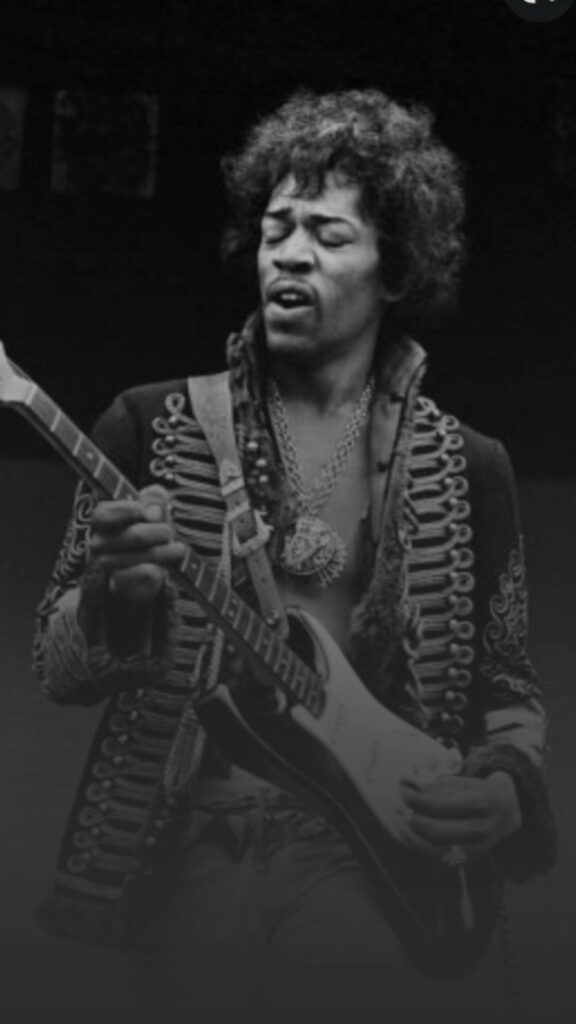
Shredding with the Stratocaster
The renowned Jimi Hendrix changed the way guitar was played forever with his groundbreaking techniques and electrifying live shows. Central to his groundbreaking sound was the iconic Fender Stratocaster.
The Stratocaster’s bright tones and versatile features perfectly complemented Hendrix’s virtuosic style, allowing him to unleash his creative prowess on stage and in the studio. With its signature double-cutaway design and trademark vibrato system, the Stratocaster became synonymous with Hendrix’s unparalleled guitar wizardry.
2. Eric Clapton
Master of the Blues and the Gibson Les Paul
The “Godfather of the Blues,” Eric Clapton, revolutionized guitar playing. The Gibson Les Paul, a legendary guitar with a reputation for warm, rich tones and sustain, was his instrument of choice.
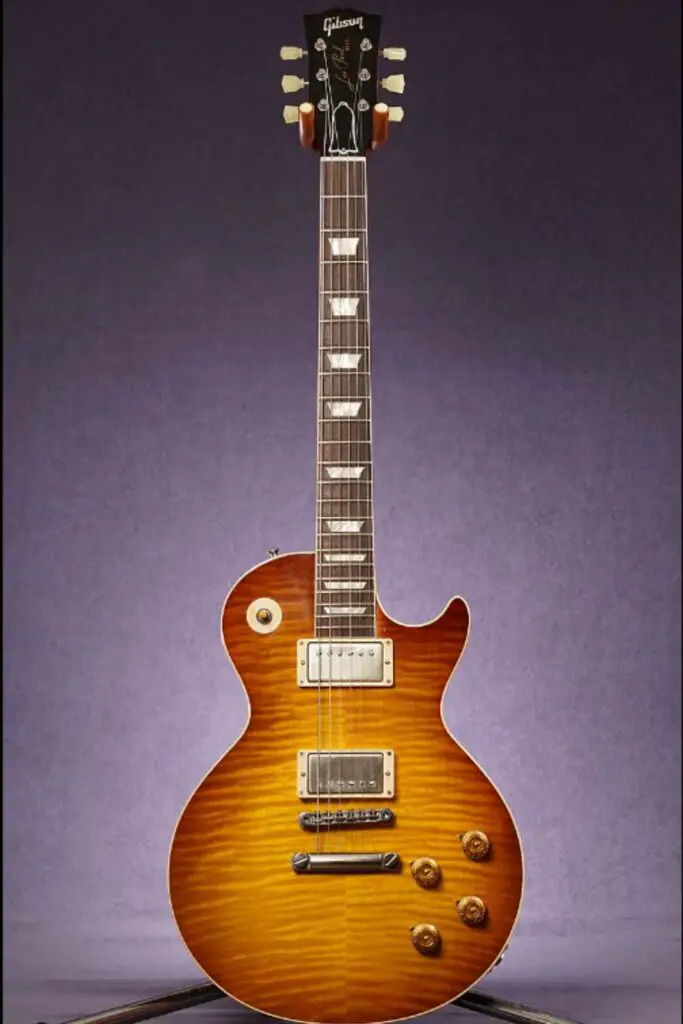
Clapton’s love for Les Paul can be traced back to his early days with the band Cream, where he developed his distinct blues sound. Les Paul’s powerful humbucker pickups and solid body construction provided Clapton with the perfect platform to deliver emotionally charged solos and soulful blues riffs.
3. Jimmy Page:
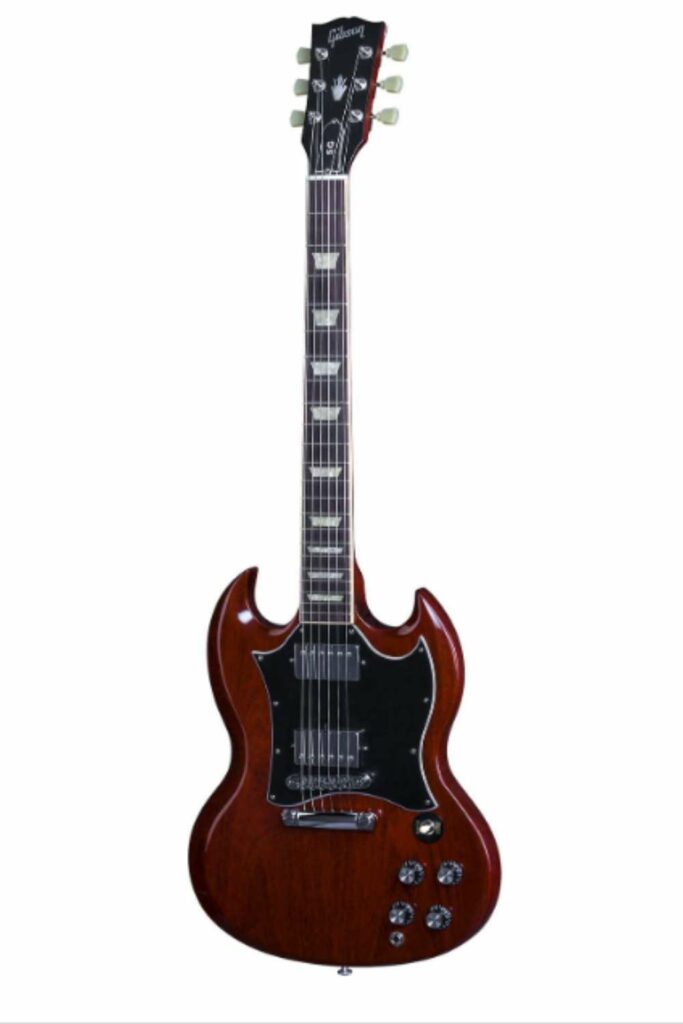
Zeppelin’s Guitar God and the Gibson SG
Few can match Jimmy Page, Led Zeppelin’s guitarist when it comes to rock and roll mastery. Page’s weapon of choice was the Gibson SG, a solid-bodied electric guitar known for its sleek design and aggressive tones.
The Gibson SG’s biting clarity and expressive capabilities were instrumental in shaping Led Zeppelin’s heavy yet intricate sound. With his virtuosity and incredible stage presence, Page showcased the versatility of the SG, pushing the boundaries of what could be achieved with this iconic instrument.
4. Slash:
Top Hat and the Gibson Les Paul
Slash, the iconic guitarist of Guns N’ Roses, is renowned for his blistering solos and undeniable stage presence. At the heart of his arsenal lies the Gibson Les Paul, a guitar that perfectly complements his fiery playing style.

Les Paul’s thick, sustaining tones and powerful pickups allowed Slash to create searing, melodic solos that cut through the mix with precision. The Gibson Les Paul, a legendary guitar with an image for warm, rich tones and sustain, was his instrument of choice.
Check This on:
5. Stevie Ray Vaughan:
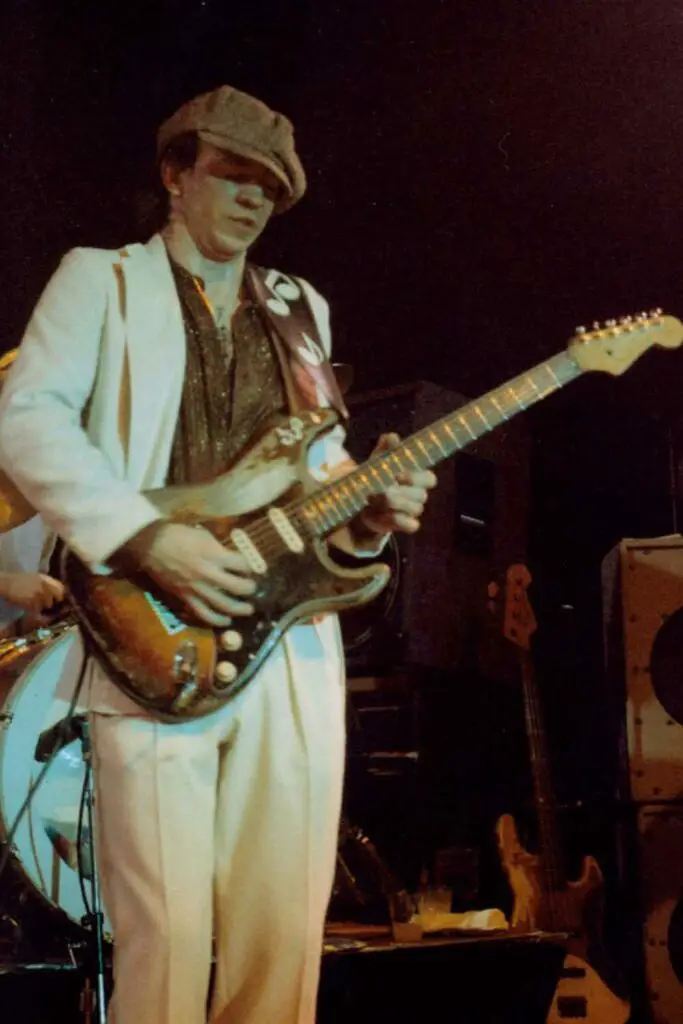
Texas Blues and the Fender Stratocaster
Stevie Ray Vaughan, a true blues virtuoso, captivated audiences with his raw talent and soulful playing. He loved the Fender Stratocaster, his preferred guitar.
The Stratocaster’s unique tonal qualities, including its snappy, bell-like highs and thick low-end response, allowed Vaughan to channel the spirit of Texas blues with unmatched authenticity. His mastery of the Stratocaster’s tremolo bar and intricate fingerpicking technique resulted in a dynamic, expressive playing style that still resonates with listeners today.
6. Tony Iommi:
The Iron Man and the Gibson SG
Black Sabbath guitarist and founder Tony Iommi is frequently credited with creating heavy metal. His chosen weapon was the Gibson SG, a guitar that perfectly suited his dark, heavy riffs.

The SG’s aggressive tone, combined with Iommi’s unique playing techniques and heavy use of artificial harmonics, became the driving force behind Black Sabbath’s groundbreaking sound. Iommi’s innovative approach to guitar playing and his influential use of the Gibson SG forever changed the landscape of rock and metal music.
Check this on:
7. David Gilmour:

Timeless Tones with Fender and Gibson
David Gilmour, the creative force behind Pink Floyd’s iconic soundscapes, embraced both Fender and Gibson guitars throughout his career. Gilmour’s Fender Stratocaster and Gibson Les Paul showed his guitar versatility.
The Stratocaster’s distinct shimmering tones and expressive tremolo system contributed to the ethereal quality of Gilmour’s playing, while Les Paul’s warm, sustaining tones added depth and richness to his solos. Gilmour’s ability to effortlessly switch between these two iconic guitars shaped the timeless sound of Pink Floyd.
8. Eddie Van Halen
Shredding like Lightning with the Frankenstrat
Eddie Van Halen, an unparalleled guitar virtuoso, made a significant impact on the world of rock guitar with his self-made Frankenstrat guitar. This unique instrument, a customized hybrid of a Fender Stratocaster and a Gibson Flying V, epitomized Van Halen’s innovative spirit.
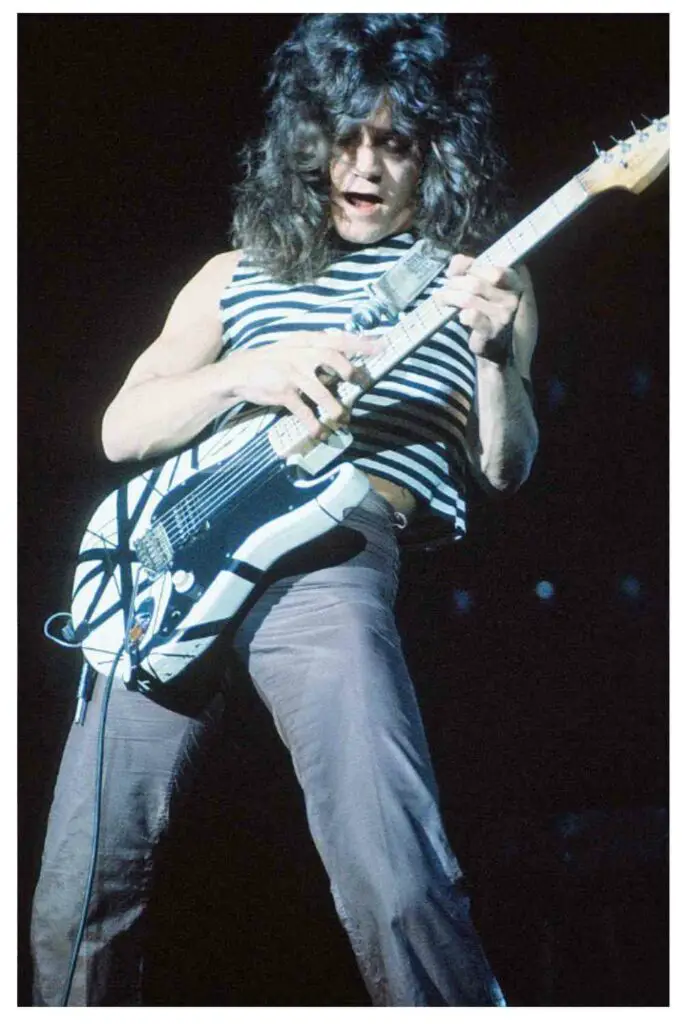
The Frankenstrat’s distinctive humbucker pickups and modified tremolo system allowed Van Halen to unleash lightning-fast solos and jaw-dropping techniques. His relentless pursuit of pushing the boundaries of guitar playing, coupled with the unconventional Frankenstrat, forever revolutionized the world of rock guitar.
Check this on:
8. B.B. King:
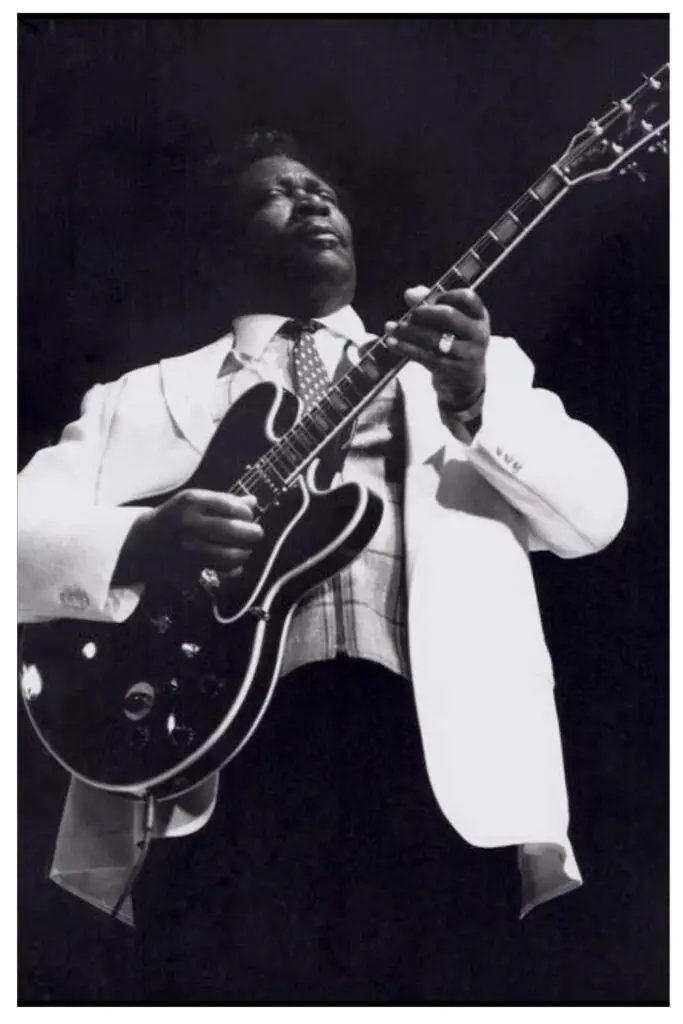
The King of Blues and the Gibson ES-335
When it comes to blues, B.B. King’s name is synonymous with soulful guitar playing. The Gibson ES-335, a semi-hollow body electric guitar with warm, rich sounds, was his favorite.
The ES-335’s hollow construction combined with King’s expressive bending and vibrato techniques, allowed him to create the iconic “singing” quality in his playing. With its smooth and articulate response, the ES-335 became an extension of King’s soul, making his melodies soar with emotion and establishing him as the undisputed King of Blues.
Check This on:
9. The Edge:
U2’s Sonic Architect and the Gibson Explorer
The Edge, the innovative guitarist of U2, pushed the boundaries of guitar playing with his pioneering use of effects and distinctive playing style. His guitar of choice was the Gibson Explorer, a bold and futuristic instrument that perfectly complemented his sonic explorations.

The Explorer’s aggressive tones, combined with The Edge’s extensive use of delay and modulation effects, allowed him to create unique soundscapes and atmospheric textures. The combination of The Edge’s musicianship and the Gibson Explorer’s striking appearance played a pivotal role in defining U2’s unmistakable guitar-driven sound.
Check this guitar on:
Summary
Exploring the guitar choices of these famous musicians reveals the intimate relationship between artists and their instruments. From Jimi Hendrix’s explosive performances with the Stratocaster to The Edge’s sonic experiments with the Gibson Explorer, these guitarists showcased the transformative power of instrument selection. The guitars discussed in this article not only shaped the sounds of these legendary musicians but also influenced the evolution of various music genres and enriched the world of guitar playing as a whole.
Frequently Asked Questions (FAQs)
Why do guitarists have different preferences in guitars?
Guitarists have different preferences in guitars due to personal playing styles, tonal preferences, and the specific requirements of the music they play.
Can a guitar choice significantly affect a guitarist’s playing style?
Yes, a guitar choice can significantly impact a guitarist’s playing style as different guitars have unique characteristics that influence the sound, feel, and versatility of the instrument.
What are some other famous guitarists and the guitars they used?
Some other famous guitarists and their respective guitars include Eric Johnson with the Fender Stratocaster and Gibson ES-335, Brian May with his homemade Red Special guitar, and Carlos Santana with the PRS Santana model.
Are specific guitars essential for achieving particular music genres?
Specific guitars can often be associated with certain music genres due to their tonal characteristics and historical usage, but it ultimately depends on the individual guitarist’s skill, musicality, and personal playing style.
Conclusion
The relationship between famous guitarists and their chosen instruments is an integral part of music history. Understanding the unique combinations of guitarists and their guitars provides valuable insights into the evolution of musical styles and the importance of instrument selection. As you delve deeper into the music of these guitar legends, may their passion and talent inspire you on your own guitar journey.
Disclaimer: This article contain: Amazon Affiliate marketing*******






